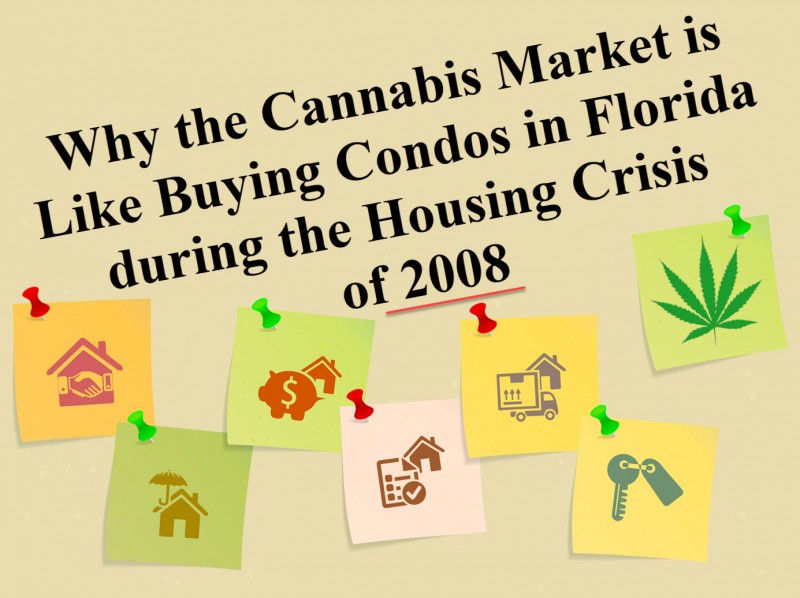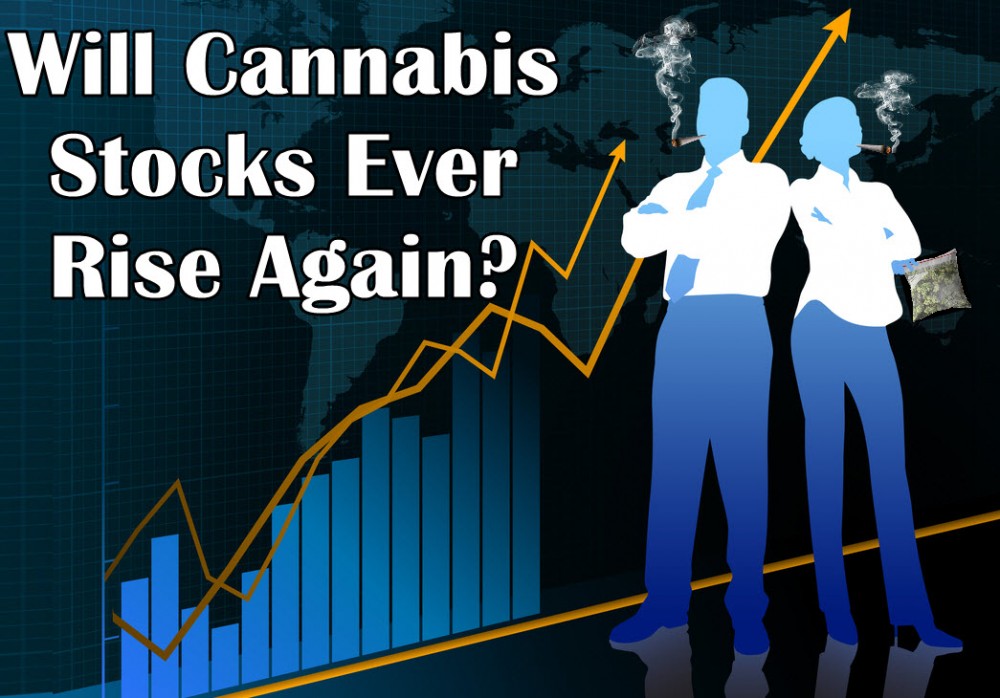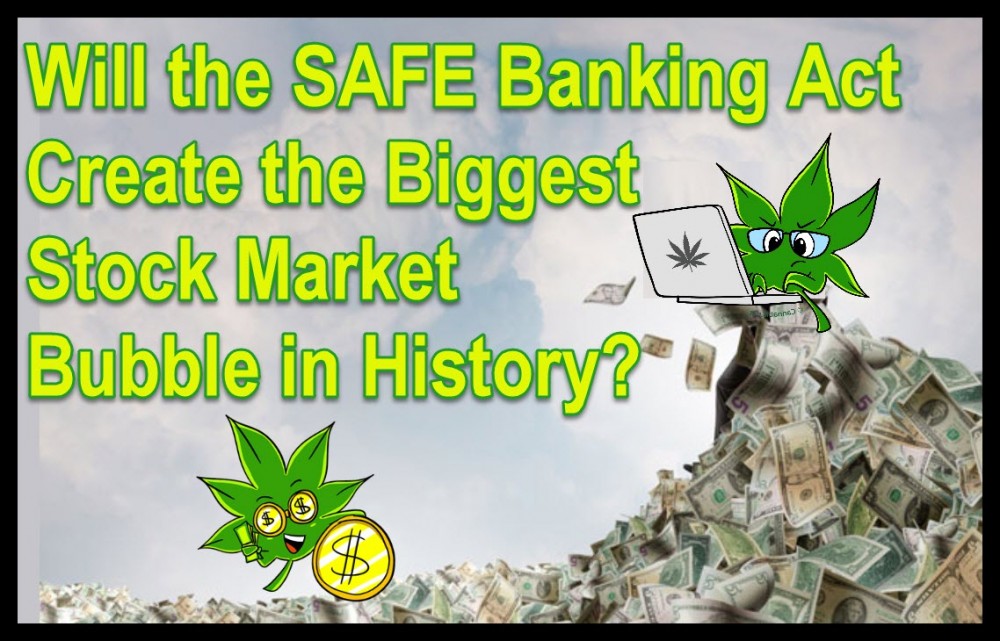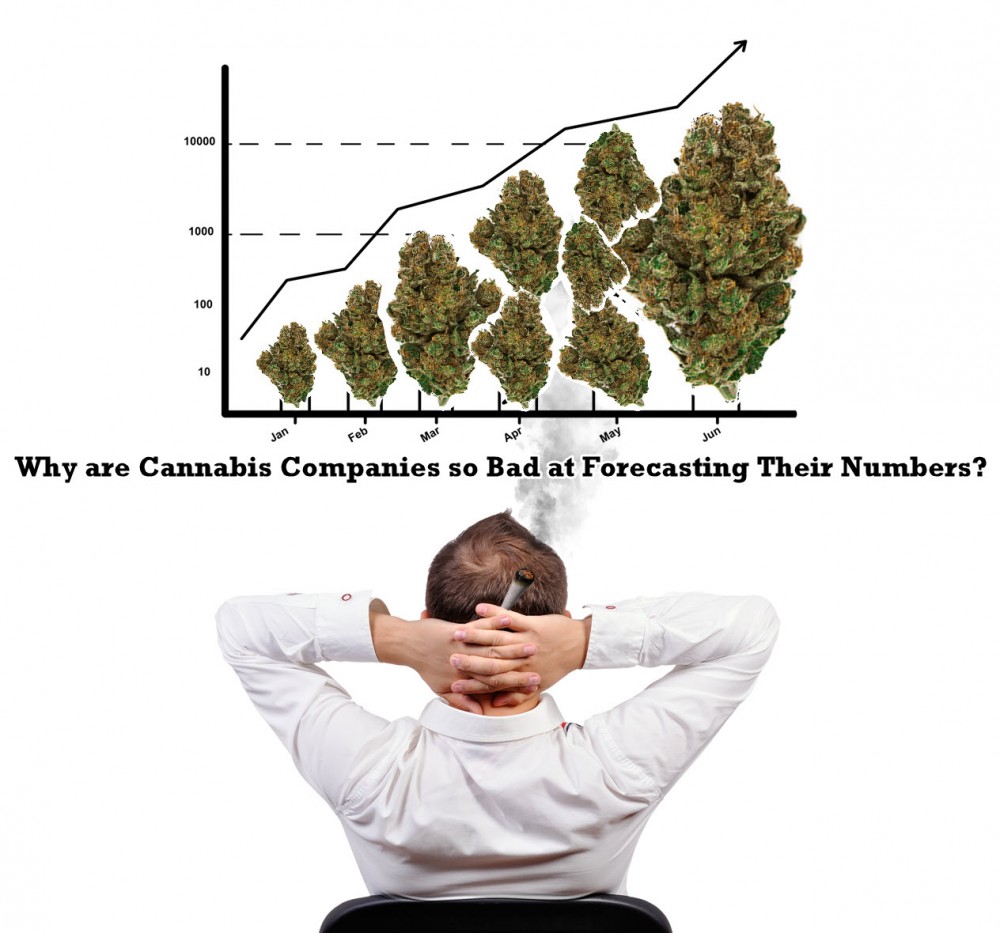Anyone want to buy some Florida condos at a great price?
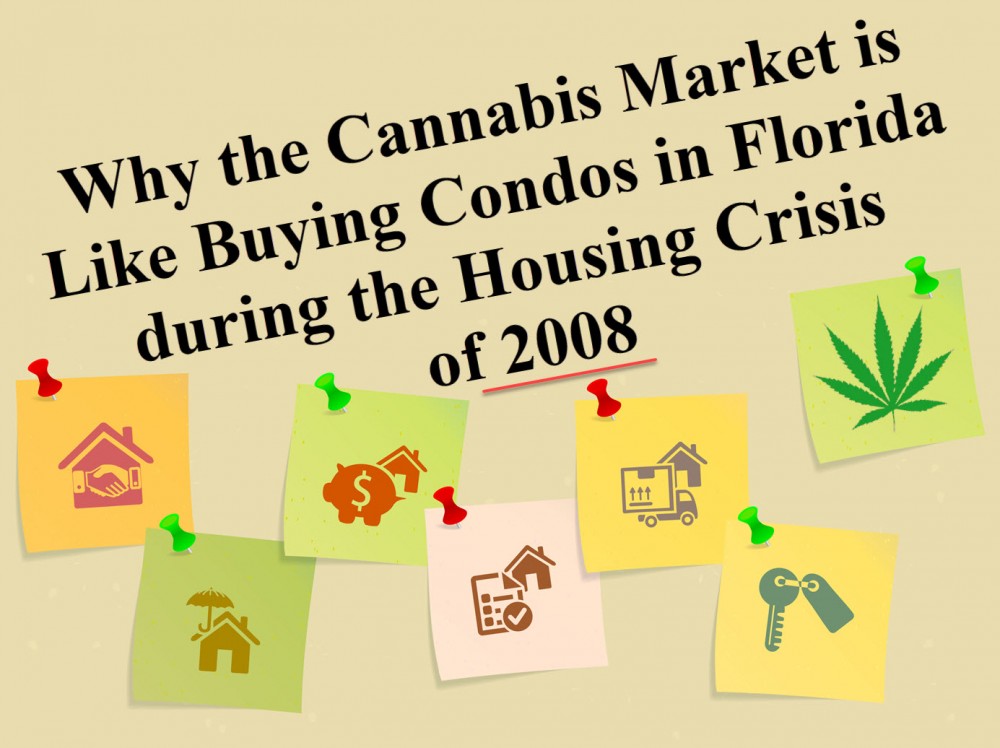
The parallel challenges of raising capital in the marijuana market
The Great Recession refers to the drastic economic downturn that started in December 2007 and continued through June 2009, ignited by the bursting of the U.S. housing bubble and leading to a global financial crisis (and some pretty cool books and movies afterwards). The cracks in the foundation of the housing market began to appear in February of 2007 when the Federal Home Loan Mortgage Corporation (Freddie Mac) announced that it would no longer purchase subprime mortgages or mortgage-related securities. Two months later, as the tide of that announcement washed ashore, subprime mortgage lender New Century Financial drowned in bankruptcy. In August 2007, American Home Mortgage Investment Corp. was also floating belly up.
Despite the carnage in the mortgage market, the Dow Jones Industrial Average broke 14,000 for the first time in history on October 9, 2007. The very next day the Dow would start an 18-month tumble, losing more than half its value before bottoming out at 6,547 on March 9, 2009. By March 2008, the venerable 85-year-old investment bank Bear Stearns collapsed and narrowly avoided bankruptcy by selling itself to JP Morgan Chase at a cut-rate price of $2 per share (on October 5, 2007, the stock had closed at $131.58). In April of 2008, I moved into a friend’s under-utilized beachfront condo in Florida. My friend suggested that with my spare time and his convertible, I find cheap property we could buy and flip. In this context, “we” meant his money and my time.
Less than a year later, we closed his first purchase; a nice 2-bedroom condo with a garage. It cost $59,000, needed under $5,000 of work and had most recently sold for $265,000. The next month, he bought a 2-bedroom townhouse for $32,850 which had sold four years earlier for over $150,000. The 3rd purchase was the sister unit to the 1st unit, costing $46,500 and with about $15K of necessary upgrades. We repeated this process until my friend had acquired about 15 condos. Purchased for cash, our targeted return was mid-teens. Within a few years these investments were earning a consistent 15 percent+ return. For real estate folks – a $65,000 unit was netting about $1,000 per month after condo fees, real estate taxes, and insurance. Repairs were sporadic and infrequent; with condos someone else mows the grass and handles exterior repairs. Aside from appliance failures, our maintenance duties were small ticket handyman chores.
We took a long and painful approach to this investing strategy, drilling deep into the sales history. We looked hard at current prices, followed by what prices were before the crash, and compared those to the original price and sale date (and every subsequent sale) of every condo in a community. We plotted the result, increasing the original price by the rate of inflation and used that as a marker for where prices should be if the market were “rational.” That first condo we bought for $59,000 had sold new 25 years earlier for $64,889, equal to $133,985 in 2009 inflation-adjusted dollars. We were paying $59,000 plus $5,000 of repairs. Research and time would most certainly lock in a juicy profit.
But everyone I knew looked at me as though I had lost my mind. Investing in real estate was just too risky, despite the yields. On February 27, 2012, during an interview on CNBC's Squawk Box, Warren Buffett commented that he thought single-family homes were an attractive investment and that he'd buy up "a couple hundred thousand" homes if it were practical to do so. Seemingly overnight, funds began to appear targeting bulk purchases of vacant residential properties. Prices jumped and yields for new properties dropped down to the 12 percent area. Buffett’s interview was a validation point that touched off a media firestorm. A few people reached out to me to let me know they were interested in some of those 16 percent deals. I calmly explained that ship had sailed. Prices were increasing and properties were now yielding in the area of 12 percent. They responded that they really wanted 16 percent.
By 2015, prices had increased even further and attractive deals were excessively hard to find. Properties we bought for $50 and $60K were now selling for $110. Even with rising rents that had pushed returns on the initial condos to 18 percent, yields for new deals were now down in the 9-10 percent range. A few people asked if those 12 percent yields were still available. Risk and opportunity are often hard to distinguish and typically travel together. Once again, the gravy train had departed and 12 percent yields were far in the rearview mirror.
Sometimes one must strike while the iron is heating up. In 2008, it was clear the recession would get ugly, but it was also clear it was cyclical and wouldn’t last forever. Properties in south Florida (and many other markets around the country) were selling for less than replacement cost. That can’t last forever and once inventory is absorbed, by necessity prices return to replacement cost or there won’t be any new construction. That bet paid off for us. My friend earned over $1 million in property gains plus years of fat returns on his invested cash.
Up in Smoke: I began tracking public cannabis stocks in 2017, and within a year assembled a hypothetical portfolio and was developing a beginner’s feel for the public market. My friends thought pot stocks were just too risky. Then on August 15, 2018, Constellation Brands [the maker of Corona and Modelo beer] announced they were investing $4 Billion in Canadian cannabis producer Canopy Growth [CG] and raising their stake by 38 percent. CG’s stock price surged 30.4 percent, valued at $10 Billion while their annual revenue was a mere $81 Million. That validation point caused the rest of the public pot stocks to jump in value. Several of my friends called to ask me which marijuana stocks to buy. All I could tell them was they had missed the boat and the bubble was now well underway. One friend, a self-described “experienced day trader” told me how wrong I was. In August 2019, when Constellation Brands wrote off a couple hundred million dollars, my day-trading friend was down 90%. Timing in stock trades, like condos in Florida, is everything.
Over the last 6 months, raising capital in the cannabis market is a lot like raising capital to buy condos during the depths of the recession. Most people simply aren’t inclined to do the work to understand the either political and business risks or the nuances of each. Finding interested accredited investors is a challenge. The best deals today are in the private sector: businesses that can leverage their investment and generate long-term cash flows for the owners, or businesses that will make attractive acquisition targets when the next round of consolidation heats up.
Today, marijuana is illegal at the federal level but tolerated under clearly defined safe harbors that protect certain businesses, provided they are compliant with state licensing protocols. Where marijuana legislation had been stalled for years, that all changed in the last election cycle. The House has passed multiple marijuana legislation bills that simply gather dust in the partisan quagmire of the Senate. Marijuana legalization at the state level has made big strides in the last two federal election cycles – which is why expectations are so strong for 2020. Eleven states now allow recreational marijuana use. That could double in November.
Private investments in cannabis today are like South Florida condos were in 2011 (just before Warren Buffett’s game-changing February 2012 comment), or like public marijuana stocks in 2017 and 2018 (just before Constellation Brands dropped a cool $4 Billion into Canopy Growth in August 2018). The opportunity is here, the signals are strong – however most investors are not inclined to undertake the research to fully understand the issues. Furthermore, the likelihood of a federal resolution is no longer “if,” but “when.” Getting into the game after marijuana becomes federally legal – when many “experts” will announce how the time is then right – will be at least a day too late. It will be akin to chasing 16% returns in a 9% market. The private markets hold great promise for those investors who take the time to understand the industry – not where it is today, but where it will be in 24 months.
Now if I could just find a few more of those folks before the “experts” declare “all clear” and the opportunities for meaningful returns evaporate…
David Rabinovitz
David Rabinovitz is the CEO of NewCann Group, a Massachusetts cannabis license applicant presently raising capital. His insights have been featured by numerous media outlets. He is the acting treasurer of MassCann/NORML and a trainer for the Massachusetts Cannabis Control Commission Social Equity training program. Connect with him on LinkedIn at https://www.linkedin.com/in/davidrabinovitz/
George Washington Hightower has worked in luxury organic cannabis for over 10 years. As a “Sensi-Somellier” he advises, operates and invests in small to medium artisanal brands across the USA & internationally. Founder of Elevated Green Health, GWH organizes upscale social environments for educational & networking purposes. COO of Full Spectrum Botanicals, which holds the 1st patent-pending formulation for combining maple syrup & cannabis into a crystalline powder with applications in food/beverage, nutraceutical, and pharma products. Co-founder of Stalk & Beans, a Massachusetts based eCommerce/transport platform.
WILL CANNABIS STOCKS RECOVER, READ MORE...
WILL CANNABIS STOCKS GO UP, READ MORE HERE...
OR..
HOW THE SAFE BANKING ACT WILL CREATED A STOCK BUBBLE.
